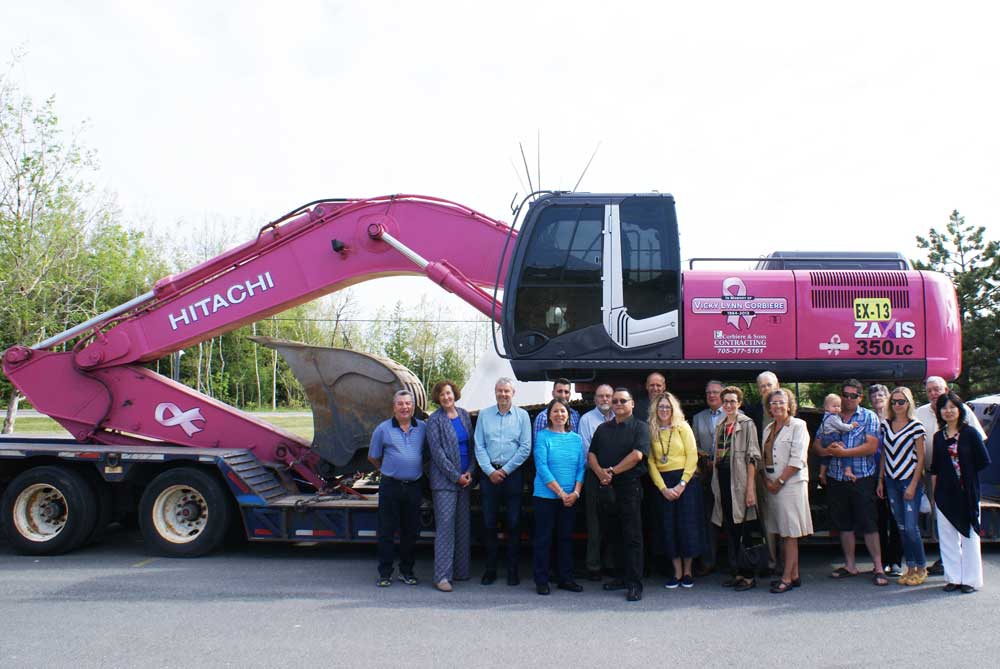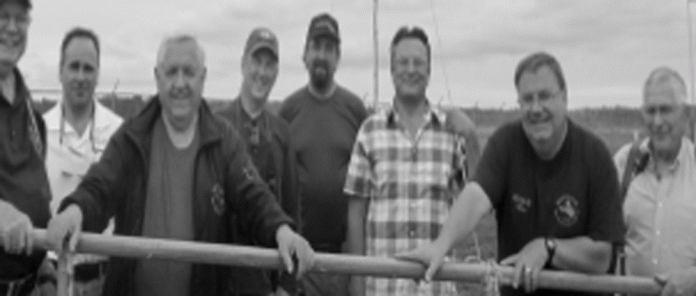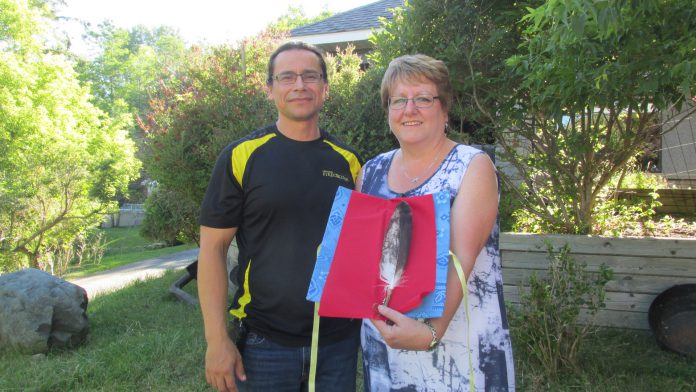AUNDECK OMNI KANING––Patrick Madahbee, former Grand Council Chief of the Anishinabek Nation, was appointed to the board of directors of Cancer Care Ontario (CCO) in March 2017 and was instrumental in bringing the board to Manitoulin Island for their June meeting. The organization tries to hold at least one meeting per year in a location other than Toronto. It only made sense, said Mr. Madahbee, whose home community is Aundeck Omni Kaning, to bring it here.
CCO President and CEO Michael Sherar was very keen for the board to visit the Island. “I’ve been to many communities across Ontario,” he said. “I personally feel that I learn a tremendous amount every time I do that. It’s so critically important. We take it (what we learn) back and continue to work with that information.”
“All of our work is aimed at making our health care system better,” continued Mr. Sherar. Their goal is to ensure a health care system that works well for everyone in the province, no matter their background or socio-economic status. “We know that many First Nations, Inuit and Metis communities face challenges with respect to access to care and health outcomes, in some respects in a much greater way than the general population. We, as a provincial agency, are committed to working in partnership to find ways that work for those communities with respect to access to excellent health care – including prevention. We had a special strategy aimed at doing that.”
CCO’s Aboriginal Cancer Strategy III 2015-2019 (ACS III) builds on the success of previous cancer strategies by continuing to work towards health equity and well-being for First Nations, Inuit and Metis peoples. The first two strategies established six relationship protocols with aboriginal groups across Ontario; developed aboriginal cancer plans and hiring of aboriginal cancer leads and patient navigators; and gained new knowledge of cancer in aboriginal communities and the creation of programs to increase cancer awareness.
With the implementation of ACS III, CCO is committed to staying focused on building productive relationships, research and surveillance, prevention, screening, palliative and end-of-life care and education.
“We saw this trip as a terrific opportunity for our board to gain a better understanding of why partnerships are so important,” Mr. Sherar said following a visit to the Wikwemikong Health Centre. “We want to make sure our health system works extremely well for all First Nations populations regardless of the circumstances, culture and values of those communities. Our understanding of these challenges is extremely important in terms of finding the best solutions. The only way to do that is by coming to the communities, not just sitting in Toronto. We have to partner, to understand and to listen so that together, we can develop a health system that does work for First Nations communities.”
Mark Hartman is CCO regional vice-president, Northeastern Regional Cancer Program (NERCP). The NERCP provides planning, care access and improvements in the Northeast Ontario region that spans from Wawa to Mattawa, from Parry Sound to the James Bay coast. The organization has developed a regional cancer plan that is specific to what’s relevant and important in this region.
Mr. Hartman also felt it was beneficial for the CCO board to hear what is being done in the Northeast region in relation to First Nations cancer care. “It gave us the opportunity to hear about community challenges such as transportation and access to services and the need for culturally competent providers to help patients feel safe in receiving care.”
CCO provides online training resources which were developed for care providers but are available to all (see elearning.cancercare.on.ca). There are 13 modules in the Aboriginal Relationships and Culturally Competent Training program that provide history and help providers understand issues faced by First Nations. Content also addresses the health-related elements mentioned in the Truth and Reconciliation report.
One focus for the Northeast region has been on improving cancer screening rates, in particular for colon, cervical and breast cancer screening. A lot of that is comprised of developing promotional materials for health centres and primary care providers to use to help them encourage participation.
Health Sciences North in Sudbury is one of three provincial hospitals participating in a pilot project in screening for lung cancer in high risk people using a low dose CT scan. CCO is working with health care providers and primary care Aboriginal health care access centres to really promote the screening project to people who might be in the high risk group.
Cancer rates in First Nations, Inuit and Metis populations are at similar or higher rates than the rest of Ontario. “What is more concerning,” said Mr. Hartman, “is that these rates are increasing. It may be because cancer is diagnosed more but other factors are social determinants of health and modifiable risk factors. Smoking rates in First Nations communities are significantly higher and this is associated with higher rates of certain cancers.”
There are higher rates of lung cancer, colon cancer and head and neck cancers in Northeastern Ontario in general as compared to the rest of Ontario. These cancers are often associated with smoking.
Early detection is important, he noted. “Finding cancer early gives more options to people.” Prevention is best, but screening programs are the next best solution.
“In other aspects of cancer care,” explained Mr. Hartman, “navigation is often difficult for those seeking access to care.” An aboriginal navigator is in place to help. “If people go to Sudbury for treatment and consultation, they can contact the navigator who can make the process more comfortable, provide language and interpretation services to help patients better understand care and options and once the person returns to their home community, the navigator can help them access services that are available within their community.”
First Nations persons looking for assistance to navigate the cancer system can self-refer by calling Health Sciences North’s Supportive Care program at 705-522-6237 ext 2175 and asking for the Aboriginal navigator.
“People find it’s a complex system made more complex with different providers, some within the community accessed through the NE LHIN and others access through their band’s community service providers,” Mr. Hartman continued. “It’s often difficult not only for people who need the services but also for those who provide them. The navigator is able to connect all these.”
“All of these things together help providers with understanding some of the challenges that their patients might face and hopefully enables them to provide better care,” concluded Mr. Hartman.
M’Chigeeng First Nation Ogimaa Linda Debassige welcomed the board and guests to Manitoulin Island. She thanked Tony Jocko of the Union of Ontario Indians for organizing the learning event and former Grand Chief Madahbee, who “carries a lot of knowledge, wisdom and understands our people. It is an important step to attend here on Manitoulin Island to see our people and how they live here. It’s different from the big smoke stacks in the city. We are from the land and go back to the land at the end of the day.”
Ogimaa Debassige also spoke about the importance of water. “We need to use our knowledge to protect the water (for our health),” she said. “I am encouraged to hear that wide perspective you carry in your hearts. It doesn’t matter what colour skin people wear. Cancer affects everyone.”





